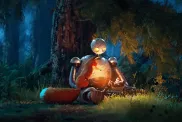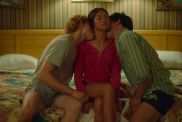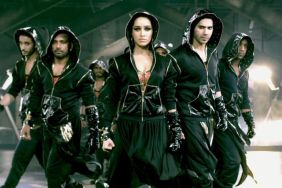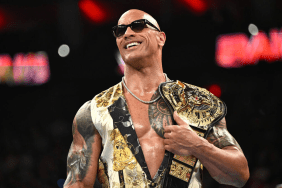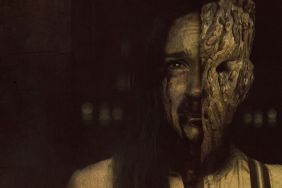
How do you prepare your actors for some of the scenes in your films? Such as Gina and Matthew in Killer Joe, Gene Hackman in French Connection, Pacino in Cruising. How do you prepare these people for some of the more intense scenes or the things their characters have to do and say?
WF: [If they can’t or won’t do it] you don’t cast them. If Linda Blair, who was 12-years-old when she made The Exorcist, if I felt or her mother felt that she would be disturbed by this experience we wouldn’t have cast her, her mother wouldn’t have allowed her to do it.
In terms of Gene Hackman in The French Connection, I got him angry because he was playing a very angry, obsessive guy.
In terms of Pacino in Cruising what you draw at to get a performance out of an actor in almost any role, as a director, you’re using their sense memories. In other words, their own experiences, that might be similar to what they have to portray.

You do that by talking to them at great length before you cast them and learning a lot about their background, their DNA, what their own attitudes are, what happened when their first love affair fell apart, what happened when they wanted to hurt or kill somebody as we all do. I will always try and find out those details, almost like a psychiatrist, before I cast an actor, and then I draw upon their sense memories when I’m directing them in a scene.
For example, on the most primitive level, with Linda Blair on The Exorcist, I would say, “Now Linda, you have to do this today,” and she’d say, “Oh no, I can’t do that!” And I’d say, “Oh yes you can!” and I became like a surrogate father to her and I used to give her a milkshake after we’d finish a scene.
The prop man would make a milkshake for her and hand it to her. Sometimes, if you saw the rushes, she’d do the most outrageous thing and then a guy would hand her a milkshake and she’d start smiling.
I would say to her, “Linda, if you don’t do this I’m not going to give you your milkshake today.” “Awww, come on!” [she’d say]. So I sort of treated it as a game with her.
You treat it as a game with actors, Matthew and Gina in Killer Joe, I’m treating it as an absurd game. I’m drawing on their own sense memories of humiliation and the need to humiliate that all of us have felt at one time or another.
So what’s an example of how you got Hackman mad?
WF: I found that Gene had problems with his father. He resented his father and therefore he resented all father figures. Now I’m younger than Gene, but as the director of the film I was a father figure and I realized that. He had told me that and he had problems with other directors that he had worked with.

So I made it a point to get him angry on the set before he had to do a take, before he had to brutalize a suspect or shoot someone in the back or chase a guy down. I got him so angered at me, and when I got him to that pitch perfect point I’d say, “Okay roll it! Now let’s do it Gene! Come on! Show me something!” Feeding off that anger, he would go into the scene.
Now this isn’t every scene in the film, but Gene very much worked against playing a racist character. Gene is not a racist, but he grew up in a small town in Illinois where there was not only racism, but the Ku Klux Klan when he was a kid. So he fought against racism and the seeds of it he experienced when he was growing up and I was able to bring him back to that by the way I treated him.
I treated him like a stern father even though I’m younger than him, but I was the authority figure on the film and that’s how a lot of that anger came out. Because it was repressed within Gene and once I figured out how to get to it I used it over and over again.
Any regrets over that? Because I think it might be a little difficult at times.
WF: No, we became even closer friends after the film was over. No, I don’t regret it. When you’re the director the important thing was to get the scene the way you want it. You do that how? By any means necessary.
It doesn’t mean hurt somebody. You’re not going to physically hurt somebody, but you have to get the performance as best you can. Some people can just go out there and do it.
I never really had to give a lot of direction to Matthew McConaughey in Killer Joe. Even though he’s mostly known for romantic comedies because he’s so good looking, I knew he not only understood the character he was playing, he grew up in that part of the country so he had known people like that and I didn’t have to say too much except, “Okay, let’s do it.”
In Todd McCarthy’s [amazon asin=”0802137407″ text=”Howard Hawks: The Grey Fox of Hollywood”] he writes that Howard Hawks told you to “Make a good chase. Make one better than anyone’s done,” which convinced you to make The French Connection. Is that true?*
WF: You can move beyond that. I met Howard Hawks once. I had a two-hour dinner with him in Los Angeles. I used to date his daughter (Kitty Hawks), whom he hadn’t seen in 17 years, and he saw her picture on the cover of Vogue magazine and called her out of the blue after 17 years of not seeing her. We lived in New York and she and I made a trip to California and had dinner with him once and we talked only superficially about films. He had nothing to do with or say about the next film I made, which was The French Connection. That’s certainly not what happened.

What is the status of Sorcerer? I know there is a lawsuit and based on what I’ve read it sounded like maybe you have a copy of the film that perhaps you aren’t allowed to show?
WF: No. In fact the two studios that I’m suing — Universal and Paramount — both said to my lawyers before the trial has even begun, “Alright, Mr. Friedkin is free to run his print.” My print is no good. It’s a 35mm print that’s completely faded as they all do.
No, Universal and Paramount have claimed they don’t know who owns Sorcerer anymore. There’s a bunch of new, young lawyers there, the company has changed hands three or four times since I made it — both studios — and the new, young lawyers that work there have no idea of the legacy of the studios.
So for about 40 years, slightly under 40 years, Sorcerer has been screened everywhere that’s requested it, at universities around the world, at film societies, at art house theaters, film clubs and it has always been granted. Last year it was run at the American Cinematheque and I was there, where they had just made a beautiful, new 35mm print of it that I thought was great. I did a Q&A, packed house, lines around the block and now, this year, they claim they don’t know who owns the picture.
So we’re suing them to find that out. It’s in Federal Court, in the 9th Circuit Court of Appeals, and we’ve asked them to produce the documents to show who does own it because they claim they don’t.
Has there been any talk with Criterion to get them to release a restored version?
WF: I can’t do that until I get control of it. They say they don’t know who owns it! So part of my claim is, well then I own it. I’m a percentage owner of the picture and I just want it to be seen by the people who want to see it and if there are any profits from the new version I’ve promised to donate them to film preservation.
So what’s next for you?
WF: I wrote my memoirs that I turned into Harper Collins and they’re going to be printed next spring.
I [also] have a script I like that’s in the process of being cast. It’s financed and now we’re putting the cast together and I hope to be able to shoot that in January. It’s a thriller, a very tense thriller set in Belgium [that will be shot] all on location.
Tomorrow I will post Part Three of my interview with Friedkin as we discuss the current state of filmmaking today such as 3-D, digital vs. film and more. If you missed Part One of the interview you can click here to read that.
* During our interview I only knew of the Howard Hawks story from something I had read on the Internet. While preparing this article only then did I learn it came from McCarthy’s book. When Friedkin asked where I heard it I told him “from the Internet”. I have rephrased the question for this interview adding the fact it came from McCarthy’s book.
